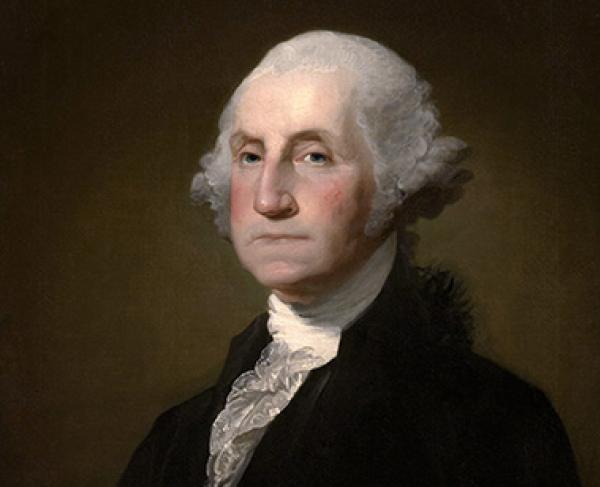George Washington

On December 14, 1799, George Washington, the first President of the United States, died at his home in Mount Vernon, Virginia. Congress commissioned Henry “Light-Horse Harry” Lee a fellow Virginian, army veteran, and friend to pen an appropriate eulogy. In 3,500 words, Lee attempted to encapsulate one of the most influential Founding Fathers. He wrote that Washington was the:
“First in war, first in peace, and first in the hearts of his countrymen.”
Before he was this influential leader, Washington was the son of a wealthy Virginian land speculator. He was born on February 22, 1732, and received little formal education in his youth. After his father’s death in 1743, he inherited a large farm, with ten slaves to work the property, and became a land surveyor. In 1750, he resigned his position to devote himself to farming and acquiring new farmland.
Two years later, inspired by his recently deceased brother Lawrence’s military service, Washington joined the Virginian Militia. He was given the rank of major and appointed to command one of the four militia districts in Virginia. His enlistment occurred as tensions between France and England ignited. British officials ordered Washington to force the French army off “British" land and Washington impressed his superiors by making a treacherous winter round-trip 77-day trek to the French Fort Le Boeuf to inform France of these commands. When France refused to comply, Washington was given the honor to force their hand. Unfortunately, he attacked the French during the Battle of Jumonville Glen, also known as the Jumonville affair, and the French commander Joseph Coulon de Jumonville died. A month later, South Carolinian militia joined Washington and the militia again tried to attack French fortifications but were unsuccessful. This incident led to the French and Indian War, also known as the Seven Years’ War. In response, Washington surrendered his troops and resigned his commission with essential military knowledge that proved vital later in his career.
After leaving the militia, Washington married the wealthy widow Martha Dandridge Custis on January 6, 1759. This marriage gave Washington land, wealth, and status as he transitioned into a gentleman farmer in the Virginian countryside. In addition, he became active in local politics during the preceding decades. When the “shot heard round the world” was fired in the Battles of Lexington and Concord on April 19, 1775, Washington set off to join other delegates in Philadelphia to attend the Continental Congress.
Several months later, when the Continental Army was officially formed to combat the British, Washington was unanimously elected as its commander. For the next eight years, Washington fought the British. Throughout this time, he only spent ten days at his Virginia home and suffered along with his men in the chilly New England winters and warm Southern summers. Only after General Charles Cornwallis surrendered after the Siege of Yorktown in October 1781 and the Treaty of Paris was signed in September 1783, did Washington resign his command and return to his home in Mount Vernon. Once there, he hoped to resume his life as a Virginia gentleman farmer.
However, the Articles of Confederation that were established after the Revolutionary War were weak in ruling the newly established United States of America. With a lack of central government, the country struggled to pay veterans, levy taxes, or make any changes in the political landscape. The Continental Congress met again to revise the plans and asked George Washington to be in attendance. When a new constitution was established, the need for a “president” of the United States was evident. George Washington, the former military commander, and public figure was the perfect candidate and he accepted. For the next eight years, Washington served tirelessly as the first president of the United States. Then, in an unprecedented move at a time when political leaders usually served for life, Washington retired. With this last act, he helped the blooming democracy to move on and form a new nation.
Lee was apt when he described Washington: he was the “first in war,” when he served as Commander-in-Chief of the Continental Army; “first in peace,” when he lead his country through its turbulent first years as President of the United States; and “first in the hearts of his countrymen,” when he helped the country become the democracy it is today.
Related Battles
389
8,589


